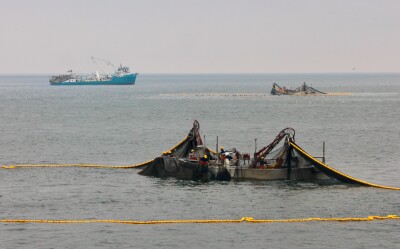It's said that the orange lobster is extremely rare — reportedly the chances of seeing one are about one in 10 million. But one of the rare bugs, whose color is caused by a genetic defect, made its way into a lobster trap in the Bay of Fundy on Friday.
The colorful lobster, which Elizabeth MacDonald is holding in this photo supplied by the New Brunswick Department of Agriculture, Aquaculture and Fisheries, is on display at the Alma Lobster Shop in Alma, New Brunswick. CBC News says that unlike his fellow lobster tank dwellers at the shop, the 5.4-pound orange lobster won't end up as someone's dinner.
The odds of seeing an orange lobster seem almost as long as those of Long Island Sound lobstermen, who have seen their fishery nearly disappear following a massive lobster die-off in the late 1990s, getting some good news. But Connecticut's few remaining lobstermen have at long last racked up a victory.
That victory comes in the form of a bill Connecticut Gov. Dannell P. Malloy signed into law last Friday — the same day the orange lobster was harvested. The bill bans the use of two pesticides, methoprene and resmethrin, near the Connecticut coast.
Lobstermen and state legislators gathered at the Darien Seafood Market on Monday where, as seen in the video below, state Sens. Bob Duff (D-Norwalk, Darien) and Carlo Leone (D-Stamford, Darien) discussed the dramatic impact the pesticides have had on the Long Island Sound lobster population and what the new legislation will do to help.
Lobstermen have long suspected that the pesticides at least in part triggered the lobster die-off. Officials now say there's evidence to suggest the pesticides did indeed play a significant role.
"Laboratory studies and research reports suggest exposure to these pesticides is a factor in degraded lobster health," says state Rep. Terry Backer (D-Stratford) in a news release from Leone's office. "Improved techniques used to detect the presence of insecticides recently revealed bioaccumulation of these compounds in tissue of lobsters collected from Long Island Sound."
Lobstermen hope the ban will trigger a rebirth of the Sound's fishery. Let's hope the odds of that happening are far better than those of seeing another orange lobster anytime soon.







